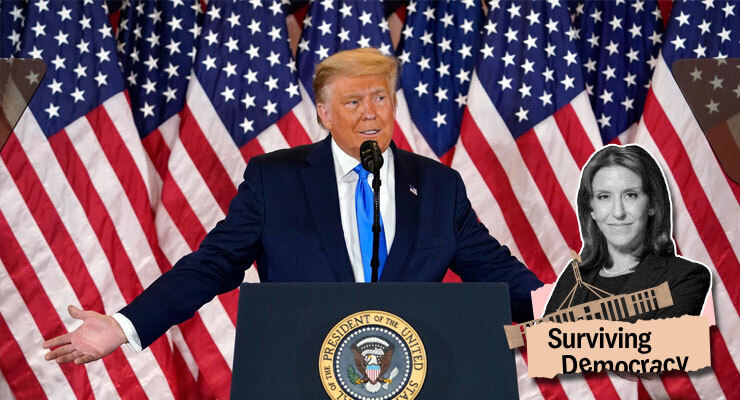
In the provocatively named How Democracies Die, Harvard political scientists Steven Levitsky and Daniel Ziblatt explain how once in power, our elected representatives can destroy the democratic system that delivered them power.
Their concern was not abstract. Even in 2018, when the book was published, Americans were already witnessing Donald Trump’s authoritarian tendencies, though it’s taken filings from the “one-six” committee to clarify how advanced and serious Trump’s efforts were to stay in office, despite losing at the polls.
But for Levitsky and Ziblatt, the Trump problem — my terminology, not theirs — began even earlier than the day in 2016 when the 45th president was sworn in. It started with the failure of the Republican Party to stop him getting on the ballot in the first place.
Political parties around the world, not just in the United States, have long functioned as gatekeepers to the extraordinary powers of elected office. While Americans liked to think it was their unique political culture that stopped the wanna-be presidential demagogues so feared by the nation’s founding fathers from gaining higher office, it wasn’t. Just like Trump, men like Henry Ford, Charles Lindbergh, Joseph McCarthy and the southern segregationist George Wallace consistently drew between 30-40% of the country’s support.
What allowed Trump to rise while they sank was the loss of power, and intestinal fortitude, of the Republican Party’s gatekeepers. In the wake of changes in the 1970s to America’s primary system that opened it to a binding vote of the people, an acceptable balance seemed to have been struck between the public’s demand for an end to the smoky-room selection of homegrown white males as candidates, and the need to filter out aspirants who lacked the requisite temperament, experience and qualifications.
But by 2015, when Trump sailed down the escalator at Trump Towers to announce his run for the presidency, the last of the guardrails Alexander Hamilton believed were essential to exclude a candidate with “talents for low intrigue, and the little arts of popularity” were gone. The unmitigated flow of money into a candidate’s coffers to be spent however they liked, and Fox’s discarding of any obligation to endorse a responsible candidate in preference to giving their authoritarian-leaning audience whatever they wanted, made the rise of Trump — or a candidate like him — inevitable.
What can Australians, concerned about the corruption of our own democracy, learn from all this?
The first is to be careful what we wish for. Over the years, I’ve heard Australians express envy of the ability of Americans to directly elect their federal leader. But this ignores the benefit of parliamentary democracy, in which the very process of government formation — the necessity that our PM be an elected member of Parliament and the favoured choice of his or her party’s majority — precludes an untested candidate, and reduces the chance of a demagogue, rising to the top.
The second is to recognise the money-in-politics issue as the serious problem for democracy that it is, and to use our vote to ensure our elected representatives do something about it. Individual and democratic corruption sap citizens of the trust they must have in their elected representatives for democracy to thrive.
Finally, we have to regulate the flow of information into the analogue and digital public square. It’s the definition of madness to allow the same alternative reality that thrives on Fox News to flourish on Sky News, but expect the impact on our democracy to be different. We also need to regulate social media to put an end to what former Google staffer Tristan Harris calls their “civil war for profit” business model.
The model, which pays us in “more likes, more followers, more attention and more reach” the more we say nasty things and engage in conflict with our fellow citizens, is the antithesis of how social engagement, civil society and the fourth estate must work if Australians want to keep living in a democracy.








I certainly don’t know any Australians who want us to adopt any part of the US political system.
But then, I’m a BB in my mid 70s. 😉
Least of all its electoral college system which allows the minority to overrule the majority.
good luck trying to regulate the cancerous evil Murdoch empire and its apprentice the Nine papers…
When your choices are for voting only for Coca Cola or Pepsi, the winner is always Cola. The US president is always captured by Big Cola which represents big business, big finance, big media, big oil and the Military Industrial Complex as well as the government departments (CIA, NED, Defence, State Department, Energy etc) that serve their interests. No American president would dare cede American hegemony on his/her watch. Big Cola says so.
“What can Australians, concerned about the corruption of our own democracy, learn from all this?”
What we need to learn, and learn very quickly, is that our largest media owner – News Corporation – is the very same organisation that owns Fox News and sided with Trump in his effort to destroy US democracy.
It appears that, in the US at least, tax cuts, crony capitalism and the removal of regulation designed to protect the public from the neighbourhood effects of unfettered capitalism, were more appealing to the Murdochs than the principles of democracy, the ‘fourth estate’, truth, and even those traditional conservative values of protecting institutions that have been proven to preserve the status quo.
Who are those that want to move from the 21stC back to the 18th.
Back to the origins of the US Constitution and its framers… land before people!
“The Founding Fathers were not interested in democracy, in fact, in a country with 3 1/4 million people, which is about what we were at the time of the separation from the UK only 700,000 people could vote — white males of property. So it’s never been terribly democratic. …and they put together a constitution which would protect property for all time. No nonsense about democracy!”
Gore Vidal: The United States of Amnesia” Documentary, 2013.
The Constitution was framed to protect the landed and wealthy of the then original 13 Colonies. It was written by the Founding Fathers to ensure that such landholdings, which in then what what was to become the USA were the wealth of the country, would be left in the hands of those already owning such. In fact many of the Founding Fathers were those very people.
An Electoral College which was constituted to give citizens in less populated and economically unproductive rural states with as many as four times the votes as those as those in more populous and economically productive urban ones, thereby violating the fundamental democratic principle of “one person, one vote;” It can also be alleged that the college was originally instituted and continues to be maintained for explicitly racist and anti-democratic purposes.
The loser of the popular vote has won the electoral college only five times before 2000. The last time such happened was in the mid 1800’s, long before universal franchise. Now it’s happened twice in 16 years and has enabled, inarguably, the two worst presidents in modern American history, both Republican. Dubya, The Faux Texan and as the Scots have it The Radge Orange Bampot!
A Senate, which until in the early part of the 20th century was not elected, Its members were selected by whatever group had control of a state’s legislature. It is there to protect the landed and wealthy class, as James Madison, a two term President of the USA and who was one of the major proponents of the Bill of Rights said this concerning the establishment of the US Senate and it was clearly anti democratic, “to protect the minority of the opulent against the majority.”*
*Statement (1787-06-26) as quoted in Notes of the Secret Debates of the Federal Convention of 1787 by Robert Yates.
Left out was The Three Fifths Compromise.
An agreement reached during the 1787 United States Constitutional Convention over the counting of slaves determining a state’s total population. This count would determine the number of seats in he House of Representatives and how much each state would pay in taxes. By including three-fifths of slaves (who had no voting rights) in the legislative apportionment, the Three-fifths Compromise provided additional representation in the House of Representatives of slave states compared to the free states.
In 1793, for example, Southern slave states had 47 of the 105 seats, but would have had only 33, had seats been assigned based on free populations. In 1812, slave states had 76 seats out of 143 instead of the 59 they would have had; in 1833, 98 seats out of 240, instead of 73.
As a result, Southern states had additional influence on the Presidency and the speaker of the HoR as well as SCOTUS until the the Civil War.
In addition, the Southern states’ insistence on equal numbers of slave and free states, which was maintained until 1850, safeguarded the Southern States as well as those strange Electoral College votes.